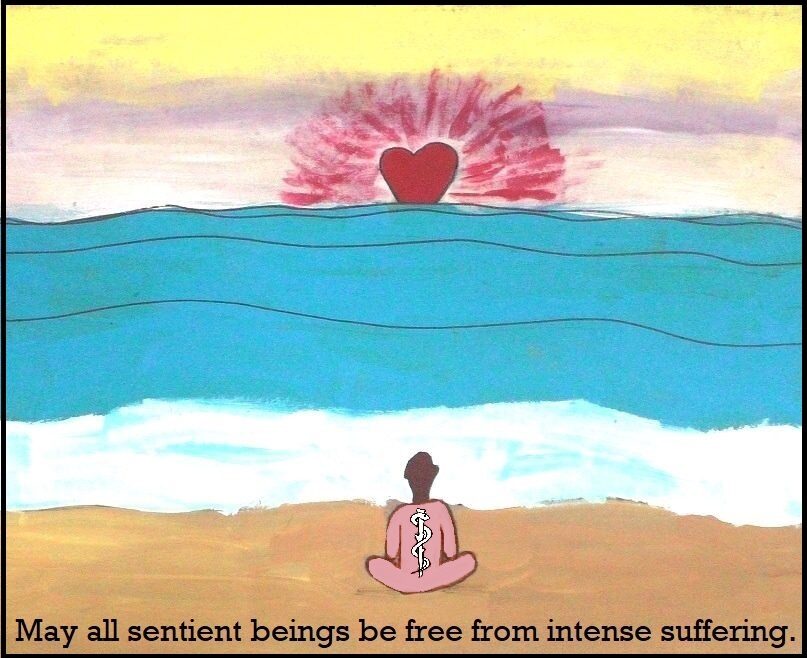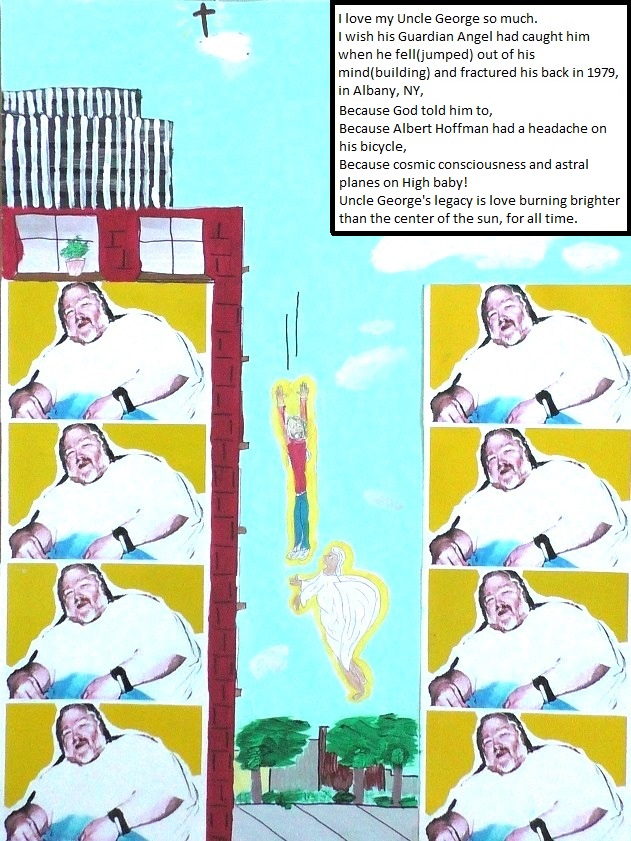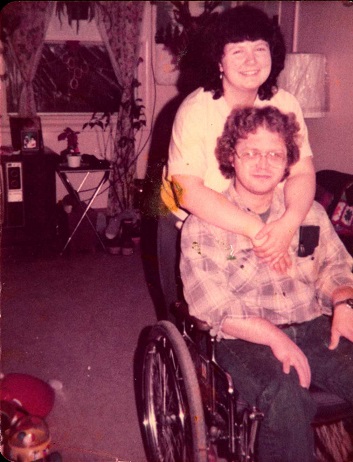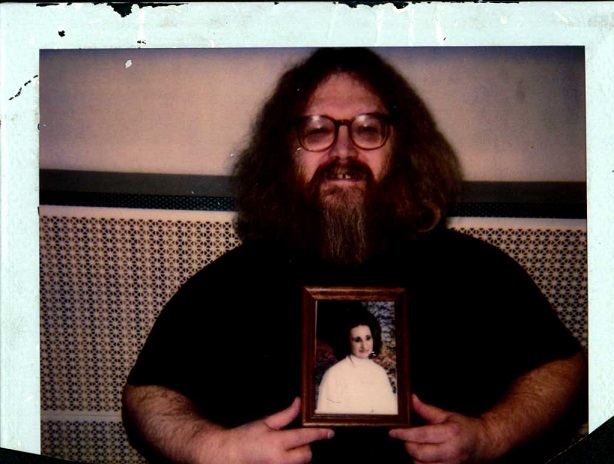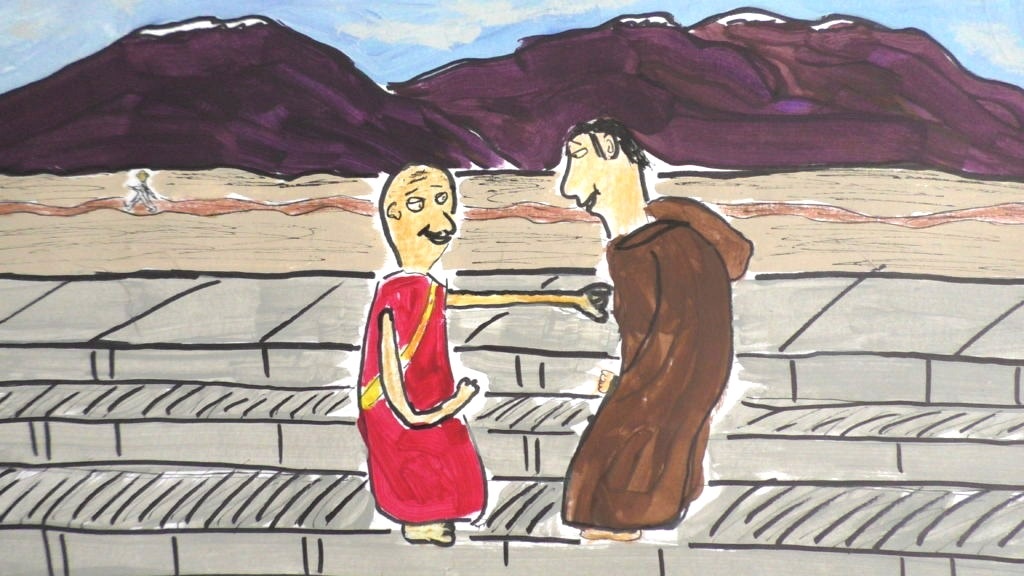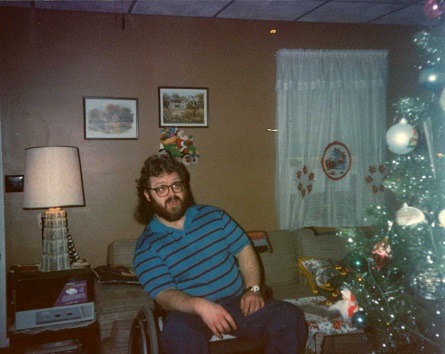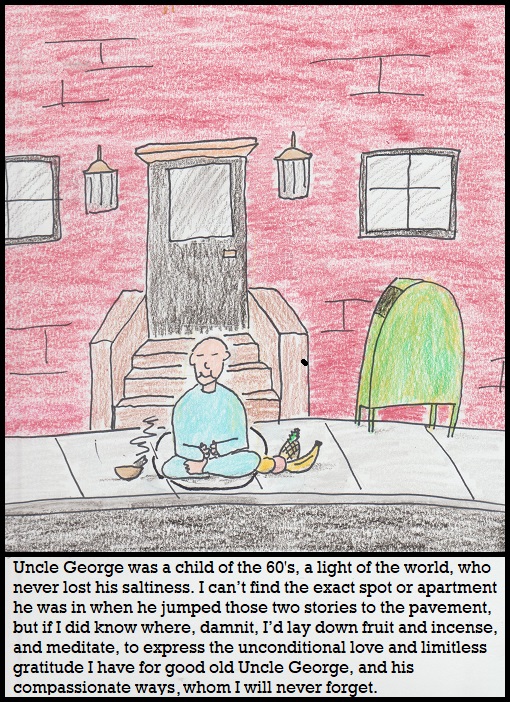Uncle George: A Personal Essay
“There is hunger all over the world, Matthew. People are really suffering.”
– George Dobler
“Hare Krishna, Peace and Love”
– George Harrison
Introduction
“I have St. Matthew my guardian angel, and Leah is never far from me.”
Uncle George
When I was a teenager, my mother’s brother George was a myth. I knew little about him, and what I did know was second-hand: I knew that in 1979 he jumped out of a second floor window in Albany, NY and broke his back. I knew that he had done LSD. I knew Uncle George suffered from Schizophrenia; that people were wire-tapping his phone and peeking through his first floor blinds, and that he tried to set his apartment on fire. I knew that he once urinated in his father’s beer bottle, and his father drank it. I knew that he had sniffed glue, and had long hair. I didn’t yet realize how much he loved George Harrison, or that he had once spoken to Richard Alpert on the telephone. That he prayed ceaselessly to the Virgin Mary, and coolly asserted the reality of astral planes. And it wasn’t until I grew older and spent much time with him that I saw what a rare gem his heart was–how he radiated compassion and warmth like a dying star.
I hope he knew how much he meant to me.
Whenever visiting Uncle George in his nursing home I would visit their Christian sanctuary before going to his room. There was never anyone else in the sanctuary; It was so still and quiet, even in the daytime. The Stations of the Cross hanging on the wall looked like a film strip, each instant of Christ’s Passion frozen in time. I remember thinking “I wish Uncle George would freeze like that sanctuary and never grow older and die, like a temporal taxidermy.” Well, Uncle George died last year, and this is my memorial to him.
First encounters with Uncle George
I interacted with Uncle George infrequently when I was younger: One Christmas my mother showed me how to braid hair using his hair. Sometimes, we would stop by his apartment in Hudson Falls to drop off tofu(he was vegetarian). After he suffered a heart attack in 2006 I went to see him in the hospital. Although we’d seldom spoken, as I entered the room he said to me, “Matthew, is that you? Good to see you.” It wasn’t until I suffered a bout of clinical depression in the late 2000’s that I really came to him. Through this harrowing experience I learned to practice Buddhist meditation, which gave me access to indescribably beatific, agape-style feelings of universal love–a set of internal experiences one can only pretend to describe to another; The feelings of connection with, and overwhelming love for everything and everyone that this experience generates is otherworldly, and makes me see how people can believe in a god.
Thomas Aquinas described this type of revolutionary, inner experience, which caused him to leave the Summa Theologiae unfinished: “The end of my labors has come. All that I have written appears to be as so much straw after the things that have been revealed to me. . .I can write no more. I have seen things that make my writings like straw.”1 I knew Uncle George was interested in similar experiences when he was younger. This caused me to reach out to him.
Leah, Astral Planes, and The Sun
“This is karma I’m living out with Leah, when she was St Joan of Arc and I was the King of France. She stood alone against her enemies. . .so, I stand alone against my enemies, now.”
– Uncle George
Uncle George met his spiritual guide Leah through an advertisement in Glens Falls, NY for a “psychic healing”. On several occasions he told me that Leah was going to do a healing soon to cure his paraplegia. I kept wondering what was taking her so long. He showed me a copy of the tabloid paper The Sun which featured a story about his paraplegia being healed by Leah. After I read the article I looked up at him in his hospital bed, his legs discreetly covered by a sheet. He laughed and said, “They lie.”
I always brought up the subject of psychedelics with Uncle George. I was, and am fascinated by the power of certain chemicals to fundamentally alter one’s perception of the world, but Uncle George was largely dismissive. After breaking his back, Uncle George stopped doing drugs. He did mention, however, that LSD took you to an astral plane. He spoke definitively on this, as if astral planes were as real as a country. But ultimately he thought of psychedelic trips as “artificial”, and proclaimed that meditation was better.
His awareness of suffering
“Eva read a book about star people, and the book said ‘one thing you don’t let somebody do, is feel like they’re all alone.”
Uncle George
Uncle George was acutely aware of suffering. I knew this because his books lying around my parents’ house when I was growing up were spiritual and pessimistic: The Upanishads, the Bhagavad Gita, and Richard Alpert’s Be Here Now. At one point he desired to become a Christian monk, no doubt to escape the trappings of life. I found his cassette tape of Gregorian Chanting in my parents’ basement. I imagined him buying that in the 1990’s to ward off the inner voices insulting him, threatening him with violence. And to push back the loneliness of disability. Religion was Uncle George’s refuge; He concluded what many spiritual seekers throughout history have concluded: ‘The way out is in.’
He spoke fondly of Schopenhauer’s world renouncing ideas, and together we would talk about war, global poverty/hunger, and animal suffering. And the spiritual desire to eliminate this suffering. Uncle George had a natural heart for sympathy. He once said, “There is hunger all over the world Matthew. People are really starving. They’re really suffering”. In his eyes you could see their pain. He donated with regularity to Christian poverty relief organizations like Christian Relief Fund, and he spoke with almost personal pride about George Harrison’s Concert for Bangladesh, which raised awareness and funds for refugees during the 1971 Bangladesh Genocide. He cared, and he inspired me to care about the world and its inhabitants, and to treat the worst off how you would want to be treated. Uncle George embodied the passage from Matthew, 25:40:
“Verily I say unto you, Inasmuch as ye have done it unto one of the least of these my brethren, ye have done it unto me.”2
Uncle George was in a lot of pain himself. He said he couldn’t use a wheelchair because his shoulders ached. He said his legs ached. His back ached from laying in bed all day. Every time I visited he had to excuse himself to urinate while coughing “46 times”. I think in time George knew that the way out was not just in himself, but outwards through death. He realized that one had to look beyond life for solace.
Catholicism and Buddhism
After meeting Leah, Uncle George converted to Catholicism for the rest of his life. He would often call my parent’s house and leave prayers on the answering machine. Uncle George knew I was interested in Buddhism. He said I would give it up eventually and come back to God. He said your problems change as you get older, problems that only Christianity can tackle. I told him a story I heard on EWTN: It was a Christian monk relating a chance meeting with a Buddhist monk in India. The Christian monk said that the two could not communicate verbally because they spoke different languages, but that the Buddhist monk reached his arm out and touched the other monk’s chest where his heart lay inside. Uncle George liked that story.
Just How Much He Meant To Me
I took a Philosophy class at SUNY Adirondack in 2016. At 9PM after my final test on the last day of class, I got a cup of coffee and drove to Uncle George’s. I was so excited to talk to him about the class and the test and Plato! And probably everything else we usually talked about: Timothy Leary, eastern religion, Bob Dylan, Mark Vonnegut’s Megavitamin therapy for Schizophrenia, or the Dalai Lama. I drove 30 minutes to see him, and when I got there he was asleep! I left him a note saying how much I enjoyed spending time with him, and how much I loved him. I wish I had recovered that note when he died, but I can’t find it:
It was lost in the madness of passing time
and physical reality.
It's probably meditating (just like Uncle George always did) in the center of his old room
at the Washington Center, lotus position,
as I type this.
facing the long mountains of Washington County, bathing forever in the sunlight amongst the urine-soaked rags peed into.
And tissues filled with the rheumatic phlegm of holy
St. George.
Conclusion
I live in Albany now, which Uncle George called the Little Apple. When he lived in Albany, my mom would visit him there on weekends. She said he was always good to her. And he always reminded me how much my mom loved and cared for me. I appreciated that he said that.
Uncle George told me he had a vision walking down Madison Avenue in Albany. He heard the voice of God talking to him, opening up to him, facing south. I can’t remember what he said. But Uncle George said it got awful lonely at the end of his time in Albany, and he would just go for long walks. So, I can only hope that God said something reassuring, like that the world needed him–someone who cared about others. Someone gentle, with flowers in their hair. Something like Matthew 5:14:
“You are the salt of the earth. But if the salt loses its savor, how can it be made salty again? You are the light of the world.”3
George was a child of the 60’s, a light of the world, who never lost his saltiness.
I can’t figure out the exact spot or apartment he was in when he jumped two stories to the pavement, but if I did know where, I’d lay down fruit and incense, and meditate on that spot to honor Uncle George and his compassionate ways.
Citations
- Frye, Peggy. “When St. Thomas Aquinas likened his work to straw, was that a retraction of what he wrote?”. Catholic Answers, https://www.catholic.com/qa/when-st-thomas-aquinas-likened-his-work-to-straw-was-that-a-retraction-of-what-he-wrote. Accessed June 18 2022.
- BibleGateway. “Matthew 25:40”, BIblegateway.com, Accessed June 18 2022.
- Bible Hub. “Matthew 5:14”, biblehub.com, https://biblehub.com/matthew/5-14.htm. Accessed June 18 2022.
